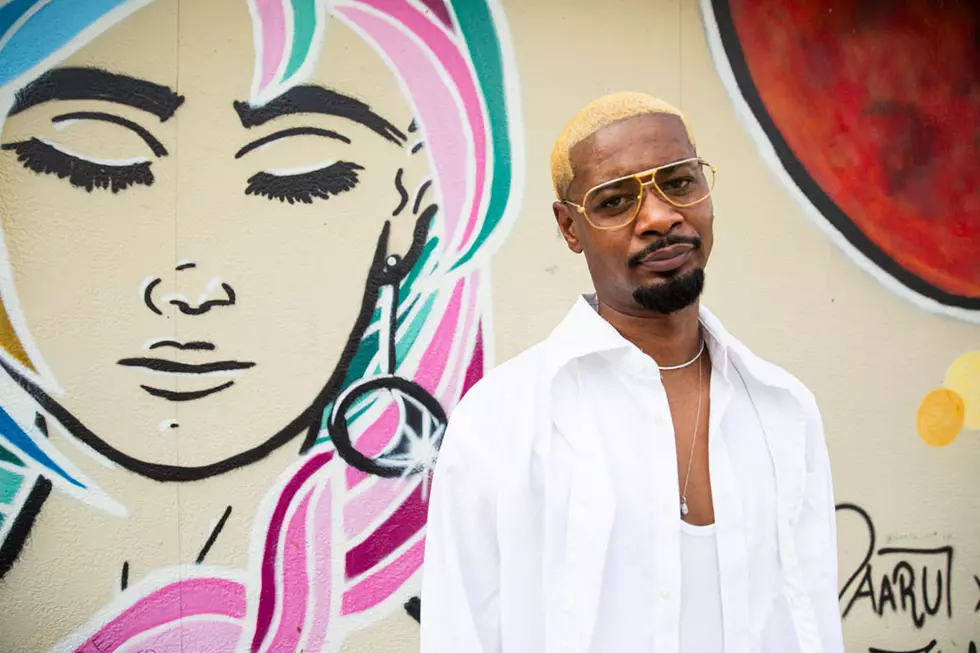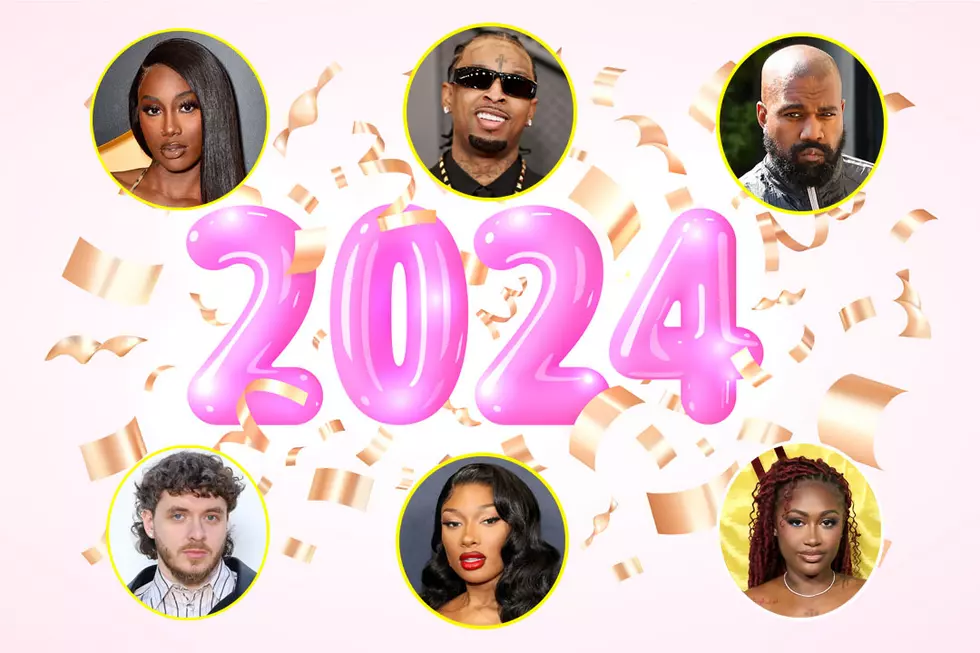
Straight Path
 To the delight of hip-hop’s opponents, and the consternation of its defenders, rap music has a long history with the penal system. The influence is undeniable: from slang and song content to album covers and the ever-popular cell-block video setting, hip-hop has been tattooed with the markings of prison culture. Beyond the fascination with the outlaw aesthetic that’s long been prominent in many forms of popular entertainment, there’s a troubling truth to be found in the relationship between the artistry and the incarceration. Now, more than ever, rappers are being put behind bars.
To the delight of hip-hop’s opponents, and the consternation of its defenders, rap music has a long history with the penal system. The influence is undeniable: from slang and song content to album covers and the ever-popular cell-block video setting, hip-hop has been tattooed with the markings of prison culture. Beyond the fascination with the outlaw aesthetic that’s long been prominent in many forms of popular entertainment, there’s a troubling truth to be found in the relationship between the artistry and the incarceration. Now, more than ever, rappers are being put behind bars.
Legal tribulations are so commonplace in the rap world that arrests have become a source of cynicism; we chuckle that well-timed criminal charges are now as vital to album promotion as in-store autograph signings. Videos are frequently stitched together from past footage of artists finishing bids, and “Free ____” T-shirts are as much a part of hip-hop style as Adidas sweat suits. But it’s not all marketing. Careers are interrupted (if not destroyed), families lose breadwinners, and opportunities for artistic expression are needlessly squandered. Rappers lose their freedom, and we lose their music.
Is this an unavoidable operating cost in an industry that regards street authenticity and a bullet-riddled backstory as the alchemic ingredients for gold and platinum sales? Or do the rappers themselves feel obligated to make good on the threats or boasts so sincerely broadcast in their rhymes? The media casts blame on executives and artists alike, but the startling number of imprisoned rappers is ultimately a product of a nation that funnels a third of its Black males ages 20–29 through jail, the penitentiary, parole or probation. From Bed-Stuy to Bankhead to Compton, the communities most ravaged by poverty, drug addiction and high rates of incarceration are consistently the same ones shouted out on wax. This is not a hip-hop tragedy, but an American one.
 Lil’ Kim recently joined Mystikal, Shyne and Beanie Sigel (who were all unavailable to comment for this article) among the increasingly large ranks of currently convicted rap stars. Over the next few pages, 13 others share firsthand accounts of their experiences in the penal system. From weapons charges to drug dealing to murder, their offenses are no different from those filling many a local police blotter. The difference, though, is that these inmates are men we’ve seen on television and heard on the radio—men who had seemingly beat the system. Their reflections on exchanging fame, fortune and freedom for a prison sentence are both poignant and cautionary. Hold your head. —Ben Detrick
Lil’ Kim recently joined Mystikal, Shyne and Beanie Sigel (who were all unavailable to comment for this article) among the increasingly large ranks of currently convicted rap stars. Over the next few pages, 13 others share firsthand accounts of their experiences in the penal system. From weapons charges to drug dealing to murder, their offenses are no different from those filling many a local police blotter. The difference, though, is that these inmates are men we’ve seen on television and heard on the radio—men who had seemingly beat the system. Their reflections on exchanging fame, fortune and freedom for a prison sentence are both poignant and cautionary. Hold your head. —Ben Detrick
#1136592
Pimp C
Texas Dept. of Criminal Justice’s Terrell Unit
With partner Bun B, Port Arthur, Texas, rapper and producer Chad “Pimp C” Butler helped pioneer Southern hip-hop throughout the ’90s. Known together as UGK, they broke nationally alongside Jay-Z on his 2000 smash “Big Pimpin’,” but the duo has yet to really celebrate their success. Pimp C was arrested that year for drawing a gun during a dispute at a local mall. Charged with aggravated assault, he pled no contest and was given community service. In January 2002, though, after falling behind on his service, he was imprisoned for an eight-year sentence. Currently housed in the Texas Department of Criminal Justice’s Terrell Unit in Rosharon, Pimp C, 31, will be eligible for parole in December. In his absence, Rap-A-Lot Records released his solo debut, The Sweet James Jones Stories, earlier this year.
I’ve been gone for about three-and-a-half years. I’ve got to use this time wisely. I write in here. The only other time I ever had tablets full of rhymes was when me and Bun went to high school, ’cause we didn’t have no records yet. After the first record, all our songs were wrote in the studio. Go in the booth, we spit it, we tear up the paper, throw it away. So I never actually had tablets of rhymes. In here, I write 10 songs, I’ll mail them home. ’Cause there’s a chance that it could get lost in here. When I get home, I’ll get back to it. I’m sitting on like 2,000 songs. That’s not to say all are going to make it to record. Some of them may be one 16, or just a verse with a title. Some of them are just beat ideas that I wanna try when I get home, wrote out in spoken word like I’m talking back to myself.
I keep a little piece of paper by me, and when I hear a old-school song that I might wanna sample, I write the title and the group down. If I don’t know, I just write out how the hook sounds. I’ll go find the record when I get out. I never produced like this before. Hopefully, when I get home and I read this stuff, it don’t sound like gibberish and maybe I can still capture the ideas.
#99A5334
Mysonne
Orleans Correctional Facility
In 1999, New York mixtape vet Mysonne Linen was on the verge of releasing his debut album on Def Jam Records when he was convicted of a pair of armed robberies that earned him a seven-to-14-year bid. Although he maintains his innocence, the 28-year-old Bronx native is in his sixth year behind bars at the Orleans Correctional Facility, in Albion, N.Y. He will have his first parole hearing next May.
The first year, I was just moving around, like, I can’t believe I’m in jail. I never let nobody else see me cry, but there was times I just went in my cell and cried to myself. Like, God, how you do this to me? I been through poverty-stricken, drug-infested families, and now you give me this? Why?
Now I’m past the stage of feeling sorry of myself, of feeling that I’m a victim. I stay to myself mostly, continue to write music.
There are recommended programs you have to take. I’m taking a business course that’ll more than likely help me when I reenter society. I work out for about an hour and a half a day. After that, I’m into my reading and writing. I’m trying to do something productive. Another inmate told me that every minute you allow yourself to be idle, they win. I carry myself with respect; I don’t get caught up in prison politics, arguing and fighting. You get into arguments here and there, but they have, by the grace of God, stayed there. When you deal with a person like a gentleman, there’s no need for it to go further than that.
#58815110
C-Murder
Jefferson Parish Correctional Facility
With a string of gold and platinum solo albums, and group projects like Tru and 504 Boyz, Corey Miller, a.k.a. C-Murder, a.k.a. C-Miller, helped build his brother Master P’s No Limit Records into New Orleans’ original rap empire. On September 30, 2003, though, C was convicted of second-degree murder for the shooting death of 16-year-old Steven Thomas. In April 2004, the original trial judge ordered a new trial because prosecutors allegedly withheld information about the criminal history of witnesses. A state appeals court denied a new trial, so the Louisiana Supreme Court will soon hear the matter. C, 30, is currently housed at the Jefferson Parish Correctional Facility in Gretna, La., where he cut his most recent LP, The Truest $#!@ I Ever Said, on contraband recording equipment.
The first thing I did when I got here was, I got all the legal books. I trust my lawyers. But at the same time, I need to see everything. So, whatever paperwork was filed, I read. I study them at night and read them every day, go over everything that’s covered in my case.
[The system] treated me unfairly from day one. Every drastic measure they took in order to convict an innocent person. People say whatever they want them to say because the whole police force is behind it. They use the police to abuse you mentally. The last thing anyone wants to do is go to jail, so you threaten anyone with that, and find out what they were up to. They have a private investigation team and lawyers. So, you have to have a solid foundation so you can put together a story, put together a picture. And then you start checking documents and records and proving it. When my lawyers first get something, first thing, they bring it to me and give me copies of whatever I’ll need.
More From XXL









